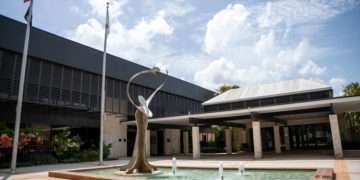Punta Gorda City Council deliberated at its May 1 meeting about the future of a city-owned home built in 1903.
It was built by politician and businessman Augustus C. Freeman whose name the house bears, and it was placed on the National Register of Historic Places in 1987.
The wooden, Queen Anne–style building was moved twice—first in 1985 before a restoration began, and again in 2005 by the city, following Hurricane Charley in 2004.
It had been a museum and later used as office space by the Charlotte County Chamber of Commerce.
The A.C. Freeman, 311 W. Retta Esplanade, also sustained damage from Hurricane Ian and remains unoccupied.
The city’s Urban Design Principal Planner Mitchell Austin gave a presentation on the current status and restoration options, including restoring the entire house or fixing the essentials and closing the building.
The cost estimates were provided by Chris-Tel Construction, the city’s Construction Manager at Risk.
The city would match the state grant of $436,000, for a total of $872,747. That figure represents a 90% cost estimate, meaning it could go higher.
The original plan was to totally rehabilitate the house so that it could be used for either a museum or for special events. Even though the city decided it might not want to do the complete renovation work, its grant money would remain the same.
City Manager Greg Murray said the reason the city was moving toward spending $872,747 to secure and stabilize the building, then close it up, was because the city “had budgeted $1.4 million initially. The reason we’re going back to just securing the envelope was because the project came in at $2.2 million. We did not have that extra $800,000 that was in the initial budget.”
Mayor Lynne Matthews had a problem closing the building. “What are we going to do with it if we do that? Do we invest that kind of money and still not have a purpose for the building?” she asked.
She said the price is going to escalate and the 90% cost projection doesn’t mean that’s the final number.
Matthews suggested seeking a Request for Proposal to determine whether a historic organization in the community would want to take it over and do the work on it, “or we deed it to one of those groups and with the understanding that they will keep it in a Historic Register status.”
Council member Donna Peterman, who has been involved with the Charlotte County Historical Society and is on the Punta Gorda History Center board, said that while there is “a lot of passion from those individuals and other people they interact with in saving the Freeman House,” those groups do not have the money it takes to manage and fund the building.
Council member Bill Dryburgh said he favored going out for a RFP to “divest ourselves of the Freeman House.”
Austin said the grant money could remain if the city let a nonprofit manage the building.
However, if City Council sold the building to a private entity and the buyer moved or used the home without a public purpose, the grant would be forfeited.
Austin was asked to verify if the city lets a nonprofit take over the building, the grant could stay with it, and he was asked to present his findings at the next Council meeting.
If the grant money goes away by selling the house or letting another organization use it, “that’s a deal breaker,” Matthews said.
The city also could choose to rent it out for special occasions or make it a museum once again.
Council member Debi Lux said she’d like to have Council hold a workshop so that locals and members of historical groups could give their expert opinions.
Council member Melissa Lockhart pointed out other problems the city might have by owning the structure. She said money would have to be set aside for maintenance, including for a new roof, and she said she would want to see regular inspections of the house, even though it would be vacant and closed.
If the city decides to keep the building, it would have to provide ADA accessibility with restrooms that would either be added to an addition or replace the kitchen.
Public Works currently oversees the building’s maintenance, and the operating cost would amount to about $10,000 to $15,000 a year, Murray said.
After much discussion, Council asked Austin to seek another estimate to determine how much more it would cost to have a fire security system and air-conditioning installed.
Austin said the new cost projection will take three to four months, at which time he would come before Council with the new information.





